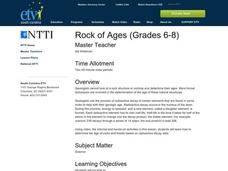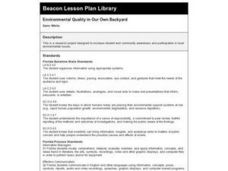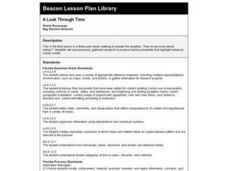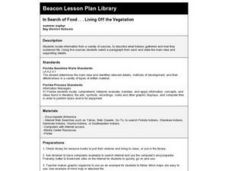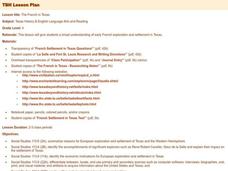Curated OER
Rock of Ages
Students use a video, the Internet and hands-on activities to explore how to determine the age of rocks and fossils based on radioactive decay data.
Curated OER
The Big Melt
Learners experiment with a variety of materials used for insulation by melting ice cubes.
Curated OER
Conservation 'Ad'vice for National Parks
Students discuss ways that the public can damage as well as preserve our natural and cultural resources. Small groups are each assigned one of the national parks and must design a poster or TV commercial that celebrates the importance of...
Curated OER
Environmental Quality in Our Own Backyard
Students research an environmental issue and decide on a course of action. They write a reseach paper and present an oral presentation based on the research.
Curated OER
A Look Through Time
Second graders explore how people find out about history. They use previously gathered research to produce tourist pamphlets that highlight historical county events.
Curated OER
Watsons Go To Birmingham--1963Patricia Wachholz
Students research the 1960s to prepare for reading the book, The Watsons Go To Birmingham, by Christopher Paul Curtis. They watch a documentary, create a timeline, and listen to music from the 1960s.
Curated OER
Who Needs a Dress Code?
Students create a poster showing examples of appropriate and inappropriate student grooming and attire. They write comments explaining the need for each rule.
Curated OER
Novel Analysis
Young scholars read the novel, Lord of the Flies, then write an essay analyzing the novel. They analyze, in small groups, characters, plot, setting, style, symbolism, theme, critical responses, and historical influences
Curated OER
In Search of Food...Living Off the Vegetation
Fourth graders locate information to describe what Indians gathered and how they sustained life. They use 5 resources, select a paragraph from each and state the main idea and supporting details.
Curated OER
A Nation of Nations Lesson Plan: Charting African Ethnicities in America
Students read a portion of the narrative, The Transatlantic Slave Trade, to explain the ethnic origins of enslaved Africans brought to the US. They create charts and bar graphs comparing ethnicities in the lowlands and tidewater regions.
Curated OER
Teaching About the Properties of Water
High schoolers use video, Internet research, graphs and tables, worksheets and hands-on experiments to investigate the properties of water in a lake environment. They work under direction or through an inquiry process.
Curated OER
BIRDS OF A FEATHER
Learners observe and identify characteristics of artifacts and fossils; explain how artifacts and fossils are used to explore the past; and identify ways that Native Americans prepared food and made tools
Curated OER
The French in Texas
Fourth graders gain a broad understanding of early French exploration and settlement in Texas. They access websites imbedded in this plan. Using their notes, 4th graders work alone or with a partner to create an illustrated journal with...
Curated OER
Who Is Norman Jewison?
Middle schoolers research the life of Norman Jewison and create a poster to present their findings to the class.
Curated OER
Five Themes of Geography
Students explore the five themes of geography: place, region, interaction, location and movement. They create a Powerpoint presentation with separate slides for each of the themes.
Curated OER
The French in Texas
Fourth graders examine early French exploration and settlement in Texas. They read handouts, explore Internet websites and take notes, and create an illustrated journal with written entries.


